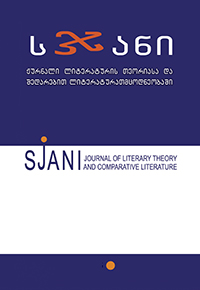სიტუაციის კომპიზიცია აგიოგრაფიაში
Composition of the Situation in Hagiography
Author(s): Ivane AmirkhanashviliSubject(s): Literary Texts
Published by: ლიტერატურის ინსტიტუტის გამომცემლობა
Keywords: overlap; inspiration; hagiography.
Summary/Abstract: Of course, marginal attitudes manifested by hagiography go beyond the genre frame, although justice requires to point out that an exception also has its own rule and if we take into consideration this view too, then it is quite realistic to speak about the peculiarity of Georgian hagiography which can be termed as the principle of national historicism. In the works written by Giorgi Mtatsmindeli, Giorgi Mtsire, Ioane Sabanisdze, Giorgi Merchule there are places in which the composition of situation appears as a principle of historicism. Antinomy as a scheme of the genre of martyr: specificity of genre of Martyrology is determined by the dynamics of confrontation. If antinomic scheme is absent, the genre as such may disappear. The narrative of “martyrdom” implies the peripeteias of hero and antihero confrontation ending with an act of martyrdom in the finale, logical end of the development of events. Otherwise, the text represents only historiographical document and not ideological work. We have just such situation in the “Martyrdom of King Archil” by Leonti Mroveli. Archil goes to the Sarkinoses by his own free will with firm decision of self-sacrifice for Christian belief. Logical conclusion is transferred from the ending to the beginning. The ignorance of literary rule turns the narration intended as hagiography into historical narrative. Special importance is given to contradictory pairs where Christian ideology is opposed to the alien faith. In such case the situation is as follows: an opponent attacks the defender of Christianity who unlike an assailant remains calm because the hero is assured of his victory beforehand. However, the author does not aim to make the situation look like a chronicle of victory. Therefore, he has no choice but mixing the triviality of the account with optimal dose of logic, and make the moral of opposition rational as far as it is possible that must turn into sacral inevitability in the finale. Presumably, the hagiographers did not create the artifacts intentionally but the trend of artistry of the events is marked in their narrations. The “Javakheti Gathering” rendered by Giorgi Merchule (“The Life of Grigol Khandzteli” written by Giorgi Merchule) is a micro play with good dramatic details, high aesthetic quality with a plot constructed on conflict contradiction and a finale almost made for the stage.
Journal: სჯანი
- Issue Year: 2011
- Issue No: 12
- Page Range: 9-14
- Page Count: 6
- Language: Georgian

